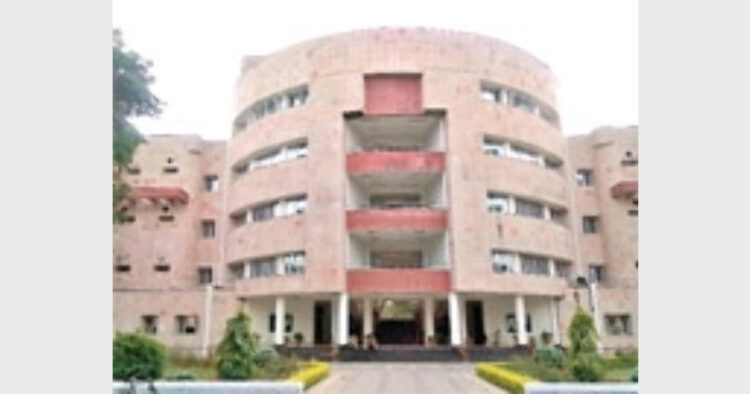 Rejecting lucrative offers from MNCs, brilliant techies in MNNIT Allahabad and also in some IITs opt for defence project at lower package and also turn to entrepreneurship & startups. Experts attribute this change in mindset to the favourable ambiance developing in the country
Rejecting lucrative offers from MNCs, brilliant techies in MNNIT Allahabad and also in some IITs opt for defence project at lower package and also turn to entrepreneurship & startups. Experts attribute this change in mindset to the favourable ambiance developing in the country
Abhay Singh (22) is one of the toppers at Electronic branch of Motilal Nehru National Institute of Technology (MNNIT), Allahabad. He belongs to a marginalised farmer’s family at Tirmasahun Village in Kushinagar District of Uttar Pradesh. He lost his father at a young age when he was studying in sixth standard. His mother, Smt Vidyanti Singh, a teacher in primary school, brought him up with the expectation that he would take up a job with higher salary. He joined the MNNIT three years back to materialise his mother’s dream. Being a brilliant student he could have easily secured a job with any Multi National Company (MNC) with higher package. But he appeared only for a reputed defence project and was instantly selected.
“Serving the nation along with learning” —Abhay Singh
The main prompting reason is to use my knowledge and skills to serve my country. Apart from that defence sector provides a real time and steep learning curve, which makes it attractive in terms of learning experience. To continue with a job one needs a constant driving force in order to work continuously and to keep him up to the mark in competitive environment. In my case that driving force is a deep feeling inside me to serve my nation. It’s like “serving along with learning”. So, for me a Bharateeya defence establishment is the right choice instead of the MNCs.
I come from a family where it is believed that a person learns everything in his life from his “society & culture” and in the end we have to pay back the debts of the society by serving it. That’s why I want to work for my country in whatever way it is possible, so by doing that I can make small contributions towards the development of my country.
Now-a-day’s things are changing readily in government sectors, because of the flexibility provided by the government in various policies and funding rules, which are going to change the scenario in near future. If we talk about defence manufacturing sector, approximately Rs 250 billion are to be invested in 7-8 years. Still 60% of requirements are met by imports, but promoting joint ventures and foreign investments will provide an excellent infrastructure to ideate and innovate which will consequently enhance working conditions.
First of all it’s a personal choice of an individual. In my opinion, we all know that brain drain is a common problem in our country and the major factor, considered behind it, is the lack of infrastructure and facilities here which are necessary for an individual to either explore new ideas or to live a decent lifestyle. But there is a change now in the atmosphere, so there are lot of opportunities in the country itself. One willing to work can easily find those facilities now in government sectors. The perks and job security in government are also no less than the high packages given by the MNCs. Apart from that, the satisfaction of working for own country also counts.
They all are very much pleased with my decision. They have continuously supported and motivated me to join this sector. |
Similar is the case of Vishal Ajmera who originally belongs to Jaipur but was born and brought up in Shilong, Meghalaya and joined the MNNIT three years back in Mechanical branch. He too is among the toppers in his branch. He has also opted for the same defence project that Abhay has opted. “I had dream of joining the Air Force since beginning. That is why I prepared for that. I have no desire to work for any MNC,” he told Organiser.
Abhay and Vishal are not alone. There are some other students in the same Institute who in the beginning opted for MNCs at higher package from Rs 11 to 12 lakh per annum, but later joined various defence projects at a lower salary. Does it show any change in the mindset of the youngsters? “The matrix in our surroundings definitely affects our thinking. Since there is a positive atmosphere in the country because of the change of guard at the Centre, the students too feel that they should use their brains and energy for their nation and not for any foreign company. Not only defence projects, many students have started thinking about Bharateeya scientific establishments like Bhabha Atomic Research Centre (BARC), etc. Recently, a team of BARC visited our campus and the students showed good interest to it,” says Siddhant Bajpai, a student of Electronic branch and also placement coordinator in MNNIT, while talking to Organiser.
There was a time when youth were mad after the MNCs due to higher package. But now they seem to have started preferring the country’s own projects. The repeated boost to startups and entrepreneurship has given them a new vision and also generated a ray of hope. “There is favourable atmosphere in the country to materialise any new idea that a youngster has in his/her mind. That is why the youth now want to become ‘job givers’ and not the ‘job seekers’ only,” says Aditya Agrawal, a student of Production and Industrial Engineering Branch and also replacement coordinator. “There is a large number of brilliant students who want to join the defence sector, but the intake in these sectors is very low. Even if they want, they do not get the opportunity. Similarly, there are many students who want to join R&D projects in the country, but there too are little opportunities. Today, Bharat happily imports nuclear fuel from different countries, but does not pay much attention to promote research on thorium, which is available in plenty in our country and is good substitute of uranium,” laments Aditya seeking more focus on R&D.
The change in mindset about MNCs does not confine to MNNIT alone. Four toppers in IIT Kanpur—three boys and one girl—in December 2015 turned down Rs 1 crore per annum offers from MNCs. Two of them reportedly settled for lower salaries in order to work in profiles, which they found to be more suitable for themselves and remaining two opted for pursuing higher studies. According to chairman of IIT-Kanpur placement cell Prof Deepu Philip the girl student and one of the boys declined the MNCs offers saying it did not match their temperament and that they wanted professional fulfilment from their jobs. The two others accepted offers of
Rs 50 lakh per annum from a smaller company.
There is another interesting trend. A 24-year old young medico turned IAS Dr Roman Saini, quit his job of Assistant Collector Jabalpur, Madhya Pradesh, to opt for free e-tutor for underprivileged students. He now uploads lectures on his platform, ‘Unacademy’, on YouTube for those aspiring to become doctors, civil servants, computer programmers, even experts in foreign languages. Ten of his Unacademy”s followers have cleared the civil services exams and more than 1.1 crore have viewed the videos. His platform has 20,000 Twitter followers and 64,000 Facebook likes. “My focus is on making quality education accessible,” he says.
Prof Rajiv Tripathi, in-charge of training and placement in MNNIT Allahabad, finds an overwhelming change in the mindset of students for entrepreneurship. “The students start thinking about entrepreneurship and startup right from the second and third semesters. Keeping it in view we have set up an exclusive Entrepreneurship Cell in the Institute. To further
motivate them we organise Entrepreneurship Summit every year and invite the successful alumni to share their experiences. A similar such summit was organised in the MNNIT campus from January 29 to 31. There seems to be awe-inspiring feeling of entrepreneurship among students,” he tells Organiser.
However, Prof Tripathi finds unsatisfactory opportunities in the power and infrastructure sectors. “During the whole placement exercise we have noticed that there is not much enthusiasm in the infrastructure sector. It remains a challenge for us to place the students from civil engineering and electrical. The PSUs have stopped coming to the campus and they now prefer the Gate score only. But the private companies too have stopped visiting the campus in these branches. It looks very surprising that one hand we are talking about development in the infrastructure and power sectors, but on the other hand job opportunities in these sectors seem to be drying up,” he says. “For some time there is a change in mindset of both the policymakers and the Institutions. The government has generated a favourable atmosphere for startups, entrepreneurship, innovation and R&D, which was missing under the previous regimes. If this trend continues for two-three more years, the matrix in the country will definitely change. But there is a practical problem. In the changing scenario, many students want to work for Bharateeya companies or the government sector but the job opportunities there are limited. The government should think about opening the government sector for recruitments,” says Shri Anuj Agrawal, managing director of Career Plus Institute for IAS coaching.
The trend witnessed among the students in MNNIT or NIT Kanpur can, however, not be generalised at the moment, this is a fact that the atmosphere in the country has started witnessing a change for the good. The experts believe that if the boost to startups continues on the part of
the policymakers for more time, good days are definitely ahead for the country. Pramod Kumar



 Abhay Singh is one of the toppers in MNNIT”s Electronic branch who, instead of joining any MNC, willingly opted for Bharateeya defence establishment. Talking to Organiser he feels the things are changing readily in the government sectors, because of the flexibility provided by the government in various policies and funding rules, which will change the scenario in the near future. Excerpts:
Abhay Singh is one of the toppers in MNNIT”s Electronic branch who, instead of joining any MNC, willingly opted for Bharateeya defence establishment. Talking to Organiser he feels the things are changing readily in the government sectors, because of the flexibility provided by the government in various policies and funding rules, which will change the scenario in the near future. Excerpts:









Comments